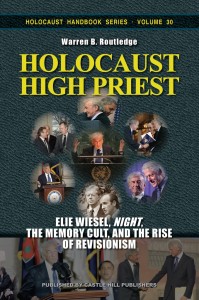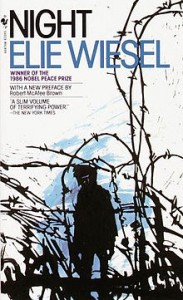Elie Wiesel’s “Night” makes Western man irrational, gasses all logic
Saturday, March 19th, 2016
BY CHRISTINE MILLER
I ACQUIRED THREE COPIES of Holocaust High Priest: Elie Wiesel, Night, the Memory Cult and the Rise of Revisionism, by Warren B. Routledge. I intend to give one copy to the Marshfield (Wisconsin) Public Library (if they accept), the other copy to Stratford Public Library and one is for myself. I was very interested in what the author, Warren B. Routledge, has to say about Elie Wiesel’s book Night, since I also challenged Night on December 1, 1997. At that time I was still a busy teacher, housewife and mother without sufficient time, nor do I have the meticulousness nor the inclination to be as thorough as Routledge. Neither was I ever at Auschwitz, therefore could not cite the mistakes which Routledge points out that Elie had made in describing the location.
Mr. Routledge has also done meticulous research on dates which are inconsistent. My earlier challenge kept to what to me were obvious absurdities which Routledge has neglected or overlooked. Thus it may be worthwhile to review my challenge.
An appeal to reason
December 1, 1997
Dear Members of the Board:
When Mr. Markwardt, head of Marshfield Public School Libraries, wrote (June 3, 1997): “The German people should suffer a shared guilt that should last many generations,” he invigorated my resolve to fight the gas chamber-holocaust lie. The next generation are my children. Does he and his fellow travelers in spirit really think that I would sit back while they press the mark of Cain on my children’s foreheads? I hereby request that the Marshfield school libraries eliminate “Night” by Elie Wiesel. ![]()
“Night” is like a Monte Python skit with this difference. In a Monte Python skit the absurdities are funny. In “Night” the absurdities are pernicious and meant to indoctrinate our children with hate.
There is the Pythonesque episode of the baby toss. “Babies were thrown into the air and the machine gunners used them as targets.” – Machine guns are not used for target practice , but for sweeping a wide field from side to side.
There is the Pythonesque episode of a wildly shooting Gestapo who, instead of shooting at the neck, shot Moshe the Beadle in the leg. “Each one (Jew) had to present his neck … How had Moshe the Beadle escaped? Miraculously. He was wounded in the leg and taken for dead …” – This really must have been a miracle in the truest sense of the word.
There is the Pythonesque episode of the copulating youngsters in an overcrowded train. However, there is one difference. In the skit, only cartoon characters are made to copulate. “Free from all social constraints young people gave way openly to instinct, taking advantage of the darkness to copulate in our midst.” – Our high school students are very liberated, but I cannot imagine any of our sweetheart couples copulating in a train so crowded that the act would have to be performed standing up. Much less can it be imagined of these Jewish youngsters brought up within a society of strict sexual morality, a society which did not condone dating but still relied on matchmakers. I think Elie has a dirty mind.
There is the Pythonesque episode of Juliek playing his violin in a space so crowded that the dead were heaped upon the living. Elie Wiesel asks: “How had he (Juliek) managed to free himself?” – My question is: How had Juliek managed to get his fiddle out uncrushed, and how was he able to move his fiddle arm in order to play from a Beethoven concerto when at the same time Elie was crushed underneath bodies and had to battle for a mouthful of air? The next morning Elie found Juliek asphyxiated by the crush of people. I am not impressed with the reasoning prowess of most people. But nevertheless we expect a certain amount of reasoning and logic from adults which we do not expect from children. Children are therefore extremely vulnerable to atrocity propaganda. If you leave this book in our school libraries you are not doing right by our kids.
Sincerely yours,
Chris Miller
An appendix:
After that challenge I came across another book by Elie Wiesel: “Tous Les Fleuves Vont a Mer – All Rivers Run to the Sea – Memories.” In a long paragraph which I had to shorten (herewith my translation), Elie has this to say. (The whole paragraph has been expunged from the English translation: “All Rivers Run to the Sea,” Schocken Books, New York.)
“That trip in the train, I described it in my first testimony, needs clarification – and it is delicate. It deals with the erotic atmosphere which prevailed in the train. In the French version I say: ‘Freed from all social constraints, the young people gave way open to instinct, taking advantage of the darkness to copulate in our midst.’ [page 20, original Night] Then I rechecked the original version in Yiddish. There the passage reads differently … It describes the timid contacts which never exceeded the bounds of decency. [Not true – it is the same in Yiddish! -cy] How could I have translated that with: copulate? I do not know. … Perhaps I was speaking of myself. … For the first time in my life I could touch a woman. …
“The rest belongs into the realm of phantasy.”
Not only is this episode a case of Elie Wiesel’s phantasy, his whole story is. Routledge wonders if Wiesel ever had set foot into Auschwitz. After rereading “Night” I wonder about that too. “But we had been marching for only a few moments when we saw the barbed wire of another camp. An iron door with this inscription over it: “Work is liberty” (work is freedom)! Auschwitz.” [page 37, original Night]
My comment: Nowadays everybody seems to be familiar with the entrance gate (it is a gate, not a door) with the inscription: “Arbeit macht frei” (work sets you free).
“Work is liberty” is Orwellian like “War is Peace.” How could Elie have made that mistake? I attempt an answer. The French original of “Night” was copyrighted in 1958. During that time neither Auschwitz, Treblinka nor Sobibor were in the news. We Germans were still hammered with the gas chambers at Dachau, Bergen-Belsen and Buchenwald. But slowly a shift took place. The gas chamber stories in the camps on German soil could no longer be maintained. The camps inaccessible behind the iron curtain took their place as extermination camps. Elie Wiesel wrote “Night” before that shift had taken place and was therefore not familiar with the inscription.
Elie was deported at the age of 14. He claims to have had a golden crown in his mouth which everybody coveted, especially the foreman, Franek. A dentist finally broke it out with a rusty spoon. Mengele, whom Elie saw wearing a monocle, and Elie as a fourteen year old having a gold crown are metachronisms (meta, after + chronos, time), chronological errors. As the people of Marshfield don’t drive to Stratford anymore in a stagecoach, in 1940 nobody wore a monocle and a kid did not get a golden crown. A child had his tooth yanked, and only if he was lucky by a dentist. I also do not know how you can get a crown out with a spoon. Needless to say, with Elie, the spoon had to be rusty. [page 50-51, original Night]
After I had written my challenge I got the German translation, “Die Nacht.” In the preface it reads that: Elie Wiesel with his parents and younger sister were deported to Auschwitz. Only later on does the book talk about sisters who remain nameless. (These two sisters were hale and hearty after Auschwitz was taken by the Russians. His younger sister and his mother died most likely in a typhus epidemic). [That is, if they were ever there, and Mrs. Miller does question whether Elie was. -cy]
In the English translation there are no gas chambers. “When he (Bela Katz) heard of our arrival, he managed to get word to us that, having been chosen for his strength, he himself put his father’s body into the crematory oven.” In the German translation it reads: “Als er von unserer Ankunft erfuhr, liess er uns sagen, dass er wegen seiner Koeperkraft dem Sonderkommando zugeteilt und dadurch gezwungen worden sei, seinen eigenen Vater in die Gaskammer zu schieben.” In the German translation “Nacht”, all the crematory ovens of “Night” are turned into gas chambers. Western man has been made irrational. That was a necessity, otherwise he could not have been made to believe in the absurdities of the Holocaust lore.
In case you are interested:
March 6, 1998
Christine B. Miller
606 Cypress Avenue
Marshfield, WI 54449
Their reply
Re: Decision of Reconsideration Committee on February 12, 1998
This is to inform you that the Materials Reconsideration Committee of the School District of Marshfield voted to retain the book “Night” by Elie Wiesel on the shelves of the Library Media Center in the Junior High School.
You may contact me if further information is needed.
Sincerely,
Ken Krahn
Superintendent of Schools
~~
Christine B. Miller was born in Bavaria in 1935 and lived through the National Socialist regime and the 2nd world war as a child on her grandparent’s farm. She emigrated to the United States in 1956, went to college, married, raised a family and became a high school German teacher in Marshfield, WI. She has published two books: Reality Check and Feldzug im Osten (Campaign in the East). She was interviewed on The Heretics’ Hour in 2011 and 2012.
This essay first appeared in The First Freedom, March 2016.
Category Featured | Tags: Tags: Christine Miller, Holocaust High Priest, Marshfield Public School Libraries, Night, Warren Routledge,
Social Networks: Facebook, Twitter, Google Bookmarks, del.icio.us, StumbleUpon, Digg, Reddit, Posterous.



